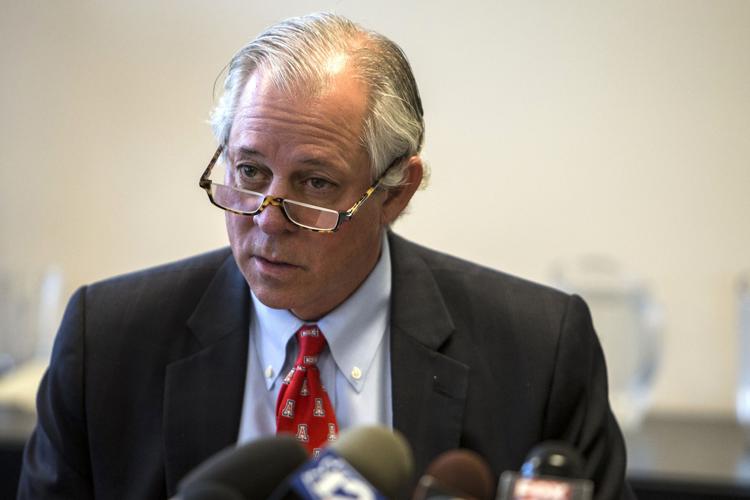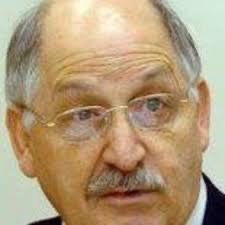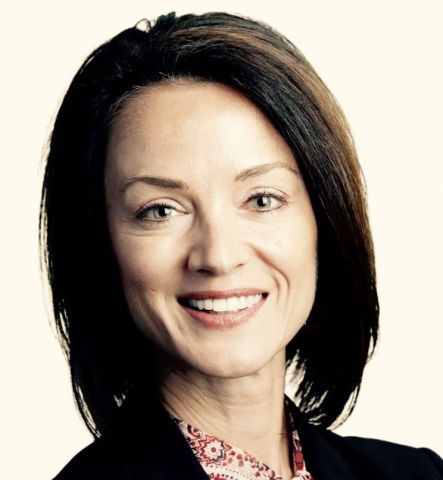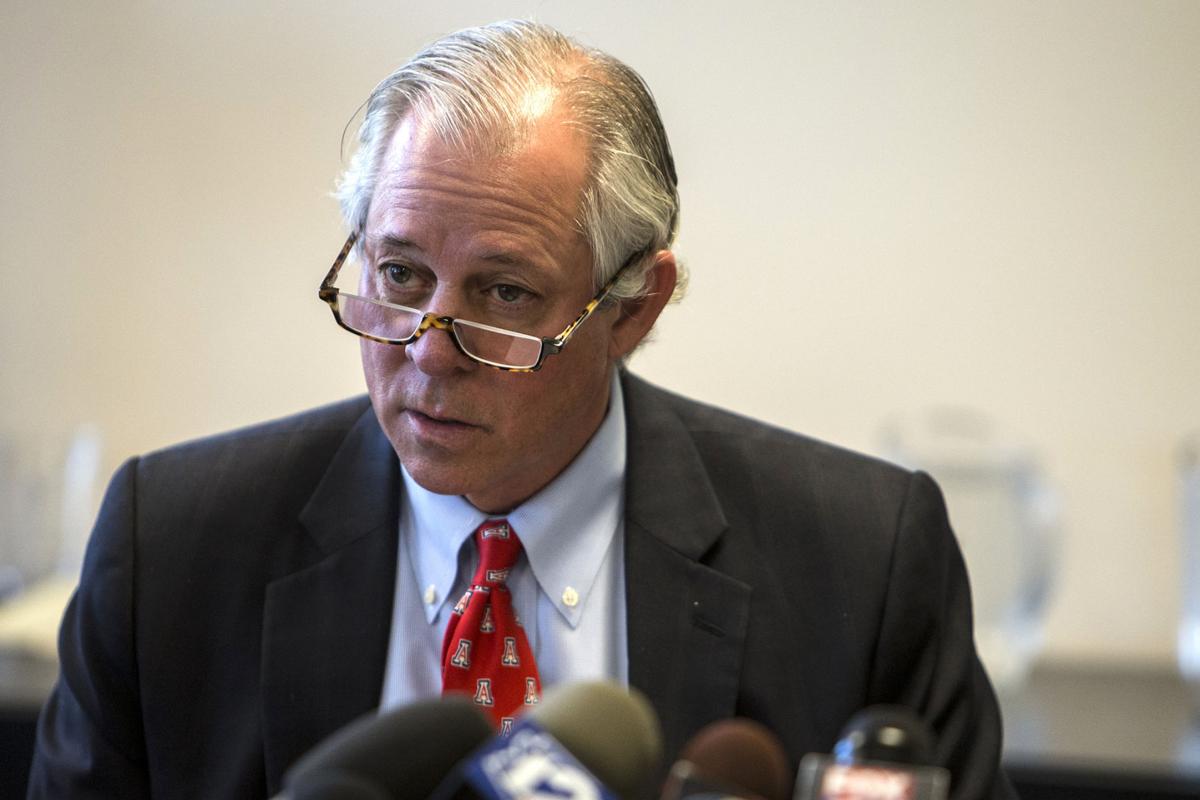University of Arizona President Robert C. Robbins' own office of the president has overspent the most, he told the Faculty Senate in a tense meeting about the UA's financial crisis.
The administrative bloat many faculty complain about is a valid concern, Robbins acknowledged in his initial remarks at the meeting late Monday afternoon.
"Central administration for the past 10 years has grown by 69%," he said. "The colleges have grown by 31%."
In a document shared by the general faculty financial recalibration committee, total UA personnel costs are stated to have increased over $500 million, or 56%, between 2013 and 2023. Faculty did not increase at the same rate, however, only increasing by 33% in that time.
The number of administrators hired since 2018 has increased by 26.8%, while the number of tenure and tenure-track faculty has decreased by 5.7%, according to a document shared by Russell Witte, a professor of medical engineering.
Robbins, acknowledging that "several colleges" have a lot of administrators with fewer students, told faculty that budget cuts are going to disproportionately impact administration in an effort to promote equity.
He was asked about layoffs by Katie Zeiders, a senator representing the College of Agriculture, Life and Environmental Sciences.
"I think it's going to be to each of the unit managers to decide about how to manage their budget," Robbins said. "I don't foresee a, you know, 5% layoff of all employees."
Zeiders pushed back. "There should be no layoffs," she urged. "This is a manufactured problem that you all have."
Robbins interrupted, asking what Zeiders meant by stating it was a "manufactured problem."
At this point, physics professor Johann Rafelski interjected, telling Robbins that the financial crisis was manufactured by the administration.
"Because you're spending too much on yourself," Rafelski told Robbins.
Leila Hudson, a professor of anthropology and the Faculty Senate president, said she has been "asked multiple times every single day" about whether it's time to call a vote of "no confidence" against Robbins.
Instead, she said, she wants to "see how the administration plans to turn our ship around" with the report Robbins must make to the Arizona Board of Regents by Dec. 15 to explain how he will deal with his leadership team's $240 million miscalculation of projected cash reserves.
"He's depending on the same team"
Robbins began his remarks Monday by stating, "I do believe that we have a revenue problem. Fundamentally, if we're spending more than we're earning, we have a problem," he stated, looking out into the room of over 50 faculty members while speaking to the more than 230 on Zoom.
He said the UA is currently overspending by about $45 million a year.
Hudson told faculty at the meeting that it has "become apparent that the president does not intend to engage shared governance in the formulation or review" of his report to the regents.
"I'm concerned that he's depending on the same team that created the management crisis to try and come up with a solution," Hudson said, continuing later on that "shared governance needs to be at the table."
Robbins, who answered questions for over an hour, said that he actually is open to faculty governance helping with the plan.
Some faculty weren't so sure.
Lucy Ziurys, a professor of astronomy, asked how it was possible to genuinely consider faculty opinions in the less than two weeks before the report is due to ABOR.
"The good news is we've been grinding on this, you know, 10, 12, 14, 16 hours a day," Robbins told her. He added that he has enlisted education professor Gary Rhoades, the chair of the general faculty financial recalibration committee, to help.
"If there are more people that want to come and help us, we can start tonight," Robbins said.
Robbins cites "urban legends"
Inviting more collaborators could help disprove disinformation, Robbins said. He specifically cited "urban legends" like claims that the University of Arizona Global Campus cost $265 million, which Robbins said is false. In reality, UAGC added that amount in operating costs, increasing the denominator in the days' cash on hand formula. The acquisition did not directly cost the $265 million figure.
Rhoades agreed with Robbins' explanation, though he criticized the lack of faculty opinion in making those decisions.
"The decision about (UAGC) was made very much against the views of the faculty," Rhoades said. "So that's what I think is important."
Samantha Harris, a professor of cellular and molecular medicine, asked Robbins about the amount of overspending that was, in some cases, forced by senior administrators, as in the case of the College of Agriculture, Life and Environmental Sciences.
"You guys have seen the train wreck unfolding for five years," she said. "And so why does nothing get done and all of the sudden it's an urgent thing?"
Robbins danced around the question, telling Harris that "every unit manager, including deans, have the fiduciary role of doing what they think is best for their college."
He added that he "encourages all colleges and all units to have healthy reserves."
Harris pushed back against Robbins' answer, telling him "that's not what we're hearing."
Lisa Rulney, the chief financial officer at the university whom many faculty blame for the financial miscalculation, was present for the meeting but was not sitting with Robbins. Instead, she sat next to Interim Provost Ronald Marx. Robbins looked at her to answer Harris' follow-up question.
"All units, colleges, support units (and) auxiliaries, submit plans that do not go into deficit," Rulney said, standing up at her table. "We don't approve plans unless the budget is breaking or positive."
She added that "we have never suggested that anyone recklessly spend their budget or plan to spend into deficit."
Her statement directly contradicts what senior leadership in at least one college have told the Arizona Daily Star. Leaders in the College of Agriculture, Life and Environmental Sciences, also known as CALES, have stated that Rulney and former provost Liesl Folks repeatedly ordered them to spend down their reserves despite being presented with evidence it would lead to a deficit.
"You're calling it reckless spending?"
Zeiders, the CALES senator, immediately pushed back against Rulney in a heated exchange.
"All of these budget decisions have gone through you," she said. "So, I'm a little confused. Now all of the sudden you're calling it reckless spending?"

UA CFO Lisa Rulney
Zeiders also went on to critique Robbins for coming to the meeting, 11 days before he must submit the plan to ABOR, without a concrete plan for the faculty to hear.
"I mean, I just laid out basically parts of the plan," Robbins responded. "It's not like I don't have ideas of what I think we should do. But we're trying to get your input and comment on what I'm talking about."
She didn't accept his response, however, accusing him of avoiding the shared governance process.
Robbins countered that he has worked with some faculty on the plan so far. He just hasn't presented it to the Faculty Senate as a whole.
"The question is going to be, what are the actual things that we're going to tell people?" he said. "Are we going to have a hiring pause? I think that's going to be likely. Are we going to make cuts? I think that's going to be likely. Are we going to have better controls? Yes."
Zeiders still wasn't satisfied.
"Coming to this meeting and throwing out ideas does not feel like a plan, nor does inviting people to join a committee nine days before ABOR seem like a plan," she said.
A legal challenge
Ted Downing, a research professor who has been at the university for over 50 years, proposed a motion in the meeting claiming that Robbins is violating state law 15-1601b. He argued that ABOR should reject any proposal the president submits.

Ted Downing
“The faculty members of each university, through their elected faculty representatives, shall participate in the governance of their respective universities and shall actively participate in the development of university policy," the law reads.
Many faculty senators countered Downing's statements, saying Robbins has invited them to work with him.
Steve Schwartz, a biochemistry professor, said he worried that passing the motion would imply the Faculty Senate doesn't want to work for a solution.
"There is no one probably in the room was more angry about where we are right now than I am," he said. "But having said that, I really wonder if we want to send a message to the Board of Regents that the faculty and administration are at war right now? That will simply exacerbate the problem and convince the regents that the faculty don't want to work for a solution."
The motion did not pass.
Rulney defends herself
Downing also directed criticism to Rulney.
"Lisa, with this happening, why did you not at least tender your resignation and (offer) to resign?" he asked. "Any other CFO of any other major organization this large would have done that."
Standing up with a microphone in hand, Rulney defended her decision to stay at the university.
"I have worked for this institution for 22 and a half years, and I absolutely love this place," she said. "I want to help work through this challenge. We have been through bigger changes before — we've been through a global pandemic — and we got through it because we all worked together."
Rulney took "responsibility for overestimating our days cash on hand ratio," but said she would "continue to work on this challenge until the president asks me not to, because I believe in this place, and I am excited about our future."
Get your morning recap of today's local news and read the full stories here: tucne.ws/morning







